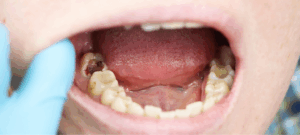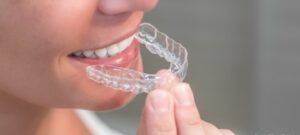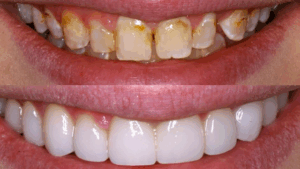Imagine yourself grabbing a bite of your favorite ice-cream in a nice summer weather or sipping your favorite soup on a cold winter night, but all of this is hindered by a long lasting hot or cold sensation in your mouth to such an extent that you cannot eat your favorite food anymore. If there is a unknown and overgrowing fear n your mind that grabbing another bite of your favorite ice-cream or sipping the hot and sour soup will cause pain and discomfort in your teeth than you might be suffering from tooth sensitivity. But, there is absolutely nothing to worry about. Tooth sensitivity is absolutely treatable, but to come to a suitable treatment, we must know the exact cause of sensitivity and why does it occur.
WHY DOES SENSTIVITY OCCURS?
Sensitivity occurs when the dentin, a porous tissue in your teeth becomes exposed or a layer covering the root that is Cementum is exposed along the gum line when the gum line recedes. The dentin has microscopic channels called tubules which are pathways to the nerve endings. When the dentinal tubules are exposed due to receding gum tissue or enamel loss, nerves are more easily triggered by certain stimuli (hot/cold) causing tooth sensitivity.
WHAT CAUSES TOOTH SENSTIVITY?
• TOOTH DECAY: Tooth decay causes the loss of tooth structure which ends up exposing the dentin and hence causing sensitivity in the respective tooth. Sometimes tooth decay is so extensive that the infection goes deep into the pulp causing severe pain and sensitivity.
• WORN TOOTH ENAMEL: Using a hard bristle toothbrush and brushing too hard causes wearing away of tooth enamel which ends up exposing dentin causing tooth sensitivity.
• CRACKED OR FRACTURED TOOTH: A cracked tooth exposes the dentin and sometimes the pulp too which cause pain and discomfort in response to hot or cold stimuli.
• RECESSION OF GUMS: Due to ageing and poor oral hygiene the gum line recedes exposing the cementum in the oral cavity which exaggerates the stimulus to hot or cold.
• TOOTH GRINDING AT NIGHT: This condition is termed as bruxism. Jaw clenching under stressful conditions or grinding the teeth at night can lead to chipping away of enamel and hence exposing the dentin which triggers the sensitivity to hot and cold.
• REGULARLY EATNG OR DRINKING ACIDI FOODS AND BEVERAGES: This habit leads to dental erosion which is the irreversible loss of dental hard tissues due to acid prevalent in he mouth.
• FILLINGS, CROWN AND TOOTH BLEACHING: Fillings and restoration of tooth renders a tooth temporarily sensitive to hot or cold. Tooth bleaching agents also make the teeth sensitive to hot or cold stimuli. Placement of crowns require preparation of the existing tooth which can lead to tooth sensitivity.
• SINUS INFECTION: Sinus infection can compress the nerve endings which can aggravate tooth sensitivity.
• POOR ORAL HYGIENE: Poor oral hygiene leads to accumulation of plaque which in long term leads to calculus formation which further recede the gum line.
• OTHER MEDIAL CONDITIONS GASTROOESOPHAGEAL REFLUX DISEASE: It is a chronic disease that occurs when stomach acid regurgitates into the mouth through the food pipe, progression of this disease causes erosion of enamel leading to sensitivity.
BULIMIA: It is a psychological disorder which is characterized by frequent episodes of binge eating followed by attempts to get rid of the food consumed by vomiting or by taking laxatives. Frequent vomiting leads to dental erosion causing tooth sensitivity.
WHEN TO SEE A DENTIST?
You should book an appointment with your dentist if your tooth sensitivity lingers for more than 30 seconds after coming in contact with extreme hot or cold temperature. If your tooth pain is severe and is happening frequently then you could have a cavity, exposed nerves, deep infection or gum disease that is severe enough to be treated by the dentist.
HOW TO TREAT TOOTH SENSTIVITY?
If your tooth sensitivity is mild, you can just begin by changing your toothpaste to the one that has been specifically made for sensitive teeth. Use of alcohol free mouthwash and a softer bristle toothbrush and proper brushing technique can help get rid of tooth sensitivity. Massaging the gums with gum paint can also help in maintaining proper oral hygiene. If these treatments does not work, then talk to your dentist about the prescription of toothpaste and mouthwash. They can also apply fluoride gel and desensitizing agents in office which can help strengthen enamel and protect teeth. TREATMENT OF MEDICAL CONDITIONS CAUSING TOOTH SENSTIVITY GERD: It can be treated by the use of acid reducers and antacids, if the condition is severe and chronic you should immediately consult a medical practitioner. BULIMIA: It can be treated by consulting a psychiatrist.
DENTAL EROSION: It can also be treated by reducing the intake of acidic foods and beverages BRUXISM Decrease in stress can help combat bruxism and unintentional jaw clenching. Being mindful about this habit can also help. An appliance such as mouth guard can be given to prevent chipping away of hard dental tissue.
ORAL PROPHYLAXIS: Scaling and root planning procedures every six months can help maintain oral hygiene and also treat gum disease. If the gum disease is so severe, surgical procedure is followed. Receding gums can be treated by gum grafting.
TOOTH DECAY AND INFECTION: It is treated by restoration and filling with a proper filling material after complete removal of infected tooth structure, if infection goes deep down into the pulp, root canal treatment is done.
FRACTURED TOOTH: It can also be treated by a root canal treatment which involves removal of dental pulp which has nerve innervations and replacing it by a suitable material.
CONCLUSION: Tooth sensitivity is a common problem faced by many individuals these days, but it has a wide range of causes and treatment plan also varies according to the cause. If you are worried about tooth sensitivity, there is no need to worry anymore. The good news is that it is absolutely treatable If you are able to practice good oral hygiene along with proper technique of brushing, you may be able to reverse the condition on your own. But if you have tooth sensitivity that is ongoing and is bothering you, please don’t wait for it to get severe.
Book your appointment here at Rohit Dental Clinic right away. The best dental professionals here will be able to diagnose your condition properly and treat you so that you can get back to enjoying your favorite food and beverages at any time.—
Dr Rohit Gupta
BDS
Cosmetic Surgeon& Implantologist(AAID, USA)
Rohit Dental Clinic
An Orthodontic & Implant centre
64-C Kitchlu Nagar Ludhiana(PB)
Call: 98723 02529
www.punjabdentistry.com






